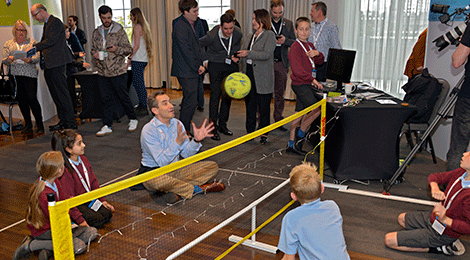//giphy.com/embed/YxYbeEh1UbsKA
The UK’s brightest innovators from schools across the country have competed to produce functional prototypes using a Raspberry Pi to produce innovations that could improve the lives of people who have conditions that limit their ability to do things the rest of us take for granted.
The final of PA Consulting Group’s fifth annual coding competition saw 9 teams of finalists, in three age groups – starting as young as school years 4 – 6 – present their inventions to an expert judging panel including Emma Payne, head of IT delivery, John Lewis and Rory Cellan-Jones, BBC technology correspondent.
It was an eye-opening event as all teams showed not only a great eye for uncovering challenges to be solved – many taking inspiration from an older relative, or even a local Paralympian – but the ability to create a working, functional prototype, all while finding the process fun.
The winners
Primary school: academic years 4 – 6, St Mary’s School (Horsham)
The team devised an ingenious door entry system, paired with a wearable device that helps deafblind people identify visitors to their residence. Their project demonstrates how communication is performed by the sense of touch via wearables.
Why the team won: An excellent idea from a team which got to grips with the project and had great communication skills which made it so simple for the judges to understand. The team had learnt coding skills such as python and used a lot of sensors in their project which impressed the judges. They showed creativity and team spirit and even showcased new ideas of how they can develop their project even further.
Finalists: Egglescliffe CE Primary School and Arnav Sharma
Secondary school: academic years 7 – 11, Max Amos from Haileybury College (Hertfordshire)
The student developed the MxStation, a monitoring tool for carers of the elderly to address risks of unattended falls. The monitoring remote sensor is worn around the neck of elderly people prone to falls. This inspirational project was developed with the student’s late grandmother in mind – a subject close to the student and something they have a passion for finding a solution to.
Why he won: Max developed a deep understanding of a meaningful problem which was well communicated to the judges. He demonstrated a passion for the challenge and at the same time showed a personal and commercial understanding which is unusual to see in someone so young. He also had an in-depth understanding of different technological equipment and incorporated a number of hardware and software applications which impressed the judges.
Finalists: Thorpe St Andrew School & Sixth Form and Young Makers Tech Club
Secondary school/college: academic years 12 – 13, King Edward VI Grammar School (Essex)
This fun and clever learning game was designed to assist and support those with Attention-Deficit Disorders and Dyslexia. It offers a series of questions to the user through a colourful interface, with responses via a set of large coloured buttons that help to keep children engaged. Instant feedback is provided as well as a cumulative score bar and visual timer.
Why the team won: The judges thought the team had all of the right elements to make this a winning project. They clearly demonstrated who their project was going to apply to and like all good inventors, kept their end-user front of mind. They thought of all of the little things that mattered and even tested it out on students at their school for feedback and to check that their invention worked in the real world.
Finalists: The College of Richard Collyer and Wales High School

Anita Chandraker, head of digital at PA Consulting Group and chair of the judging panel said: “This is our fifth year running the competition and we’re so pleased to see that the enthusiasm, drive and creativity is still there after all these years.
“It’s astounding to see the level of entries getting more and more advanced each year and this year is no exception.
“This year’s finalists have grasped the theme with careful understanding of the topic and developed their ideas with a real willingness to produce smart inventions to help those around them. It would be wonderful to see some of the inventions made into a reality in the near future.
“Our aim is to make a difference by inspiring the innovators of the future. We want to encourage the children to develop their coding skills, not just focus on technology. As a company we are passionate about technology and innovation and use this competition as a platform to guide the next generation to be as involved in it as we are.”






